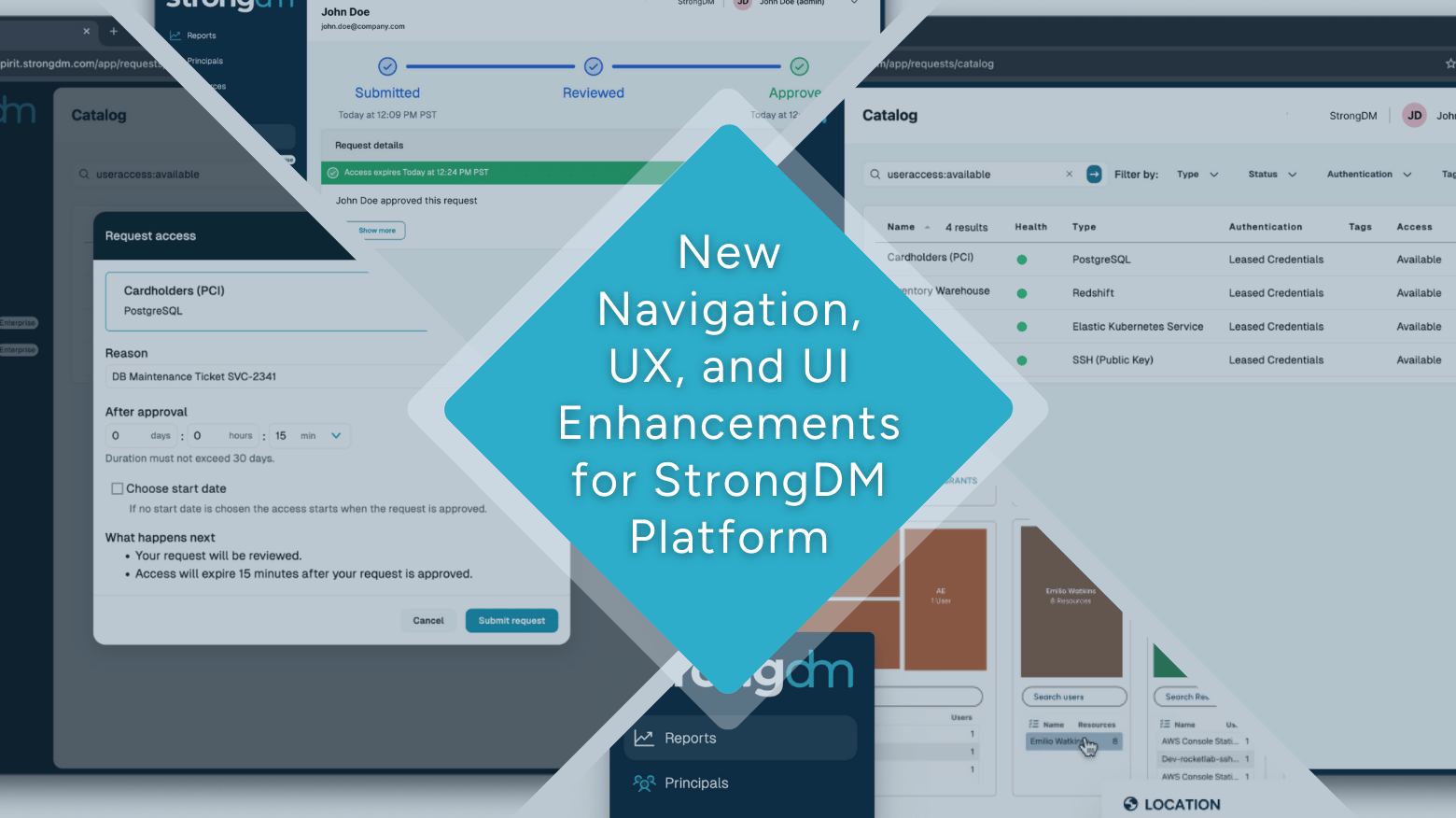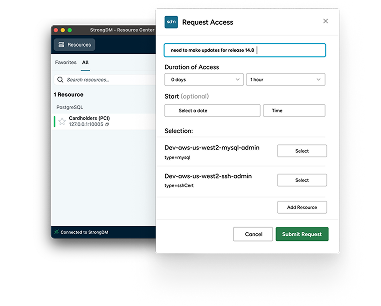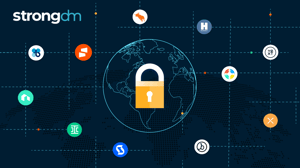New Navigation, UX, and UI Enhancements for StrongDM Platform

Contents
Built for Security. Loved by Devs.
- Free Trial — No Credit Card Needed
- Full Access to All Features
- Trusted by the Fortune 100, early startups, and everyone in between
Security and operations teams place their faith in solutions that help them meet compliance requirements and protect their environments from threats and data breaches. However, in the pursuit of their security goals, many solutions overlook a critical aspect of problem solving — the user experience (UX) of the solution, particularly for the admins and engineers who use them daily.
A well-designed user experience for cybersecurity tools is an operational necessity that can determine how well, and the extent to which, the tool is used. And that adoption and usage has an important correlation to the overall effectiveness of an enterprise's security posture.
To facilitate this efficacy, StrongDM has launched significant updates and improvements to the StrongDM user experience for both web browser and desktop applications. Visual elements have been updated to not only match StrongDM branding colors but increase readability and accessibility. Navigation is reorganized to map to user actions and increase usability.
The goal of this update is to modernize the look and feel and provide an intuitive user experience that is simple without compromising on the security and enterprise needs. We know that giving users a better technology experience ultimately translates into higher adoption and better alignment with goals. With these updates, we intend to provide our users with a variety of benefits, including:
- Increased productivity: A well-designed, intuitive interface can streamline daily workflows, boosting efficiency and helping teams accomplish more in less time.
- Reduced human error: Systems with a user-friendly experience, especially those designed to identify and deal with security-related issues, make it easier to configure and manage, reducing the likelihood of mistakes and enhancing security.
- Improved job satisfaction and engagement: Easy-to-use security tool help users feel more confident and empowered in their roles, reducing frustration and fostering a positive, fulfilling work environment.
A Few of the Key Changes
- The navigation menu now has updated terminology and groupings for easier access.
- The submenu behavior has been improved so that when one submenu is opened, others automatically close. This makes it simpler for users to identify their current location within the app and view other top-level sections.
- Simple icons in the navigation menu now provide clear visual cues about the content within each section.
- The header has been refined to enhance readability and visual appeal.
- A refreshed color scheme has been introduced.
- The overall style has been modernized, with updates such as rounded corners on buttons, headers, tabs, tables, alerts, forms, and dropdowns.
- Adjustments to depth, opacity, size, spacing, and text styles create a sleek, contemporary look.
- The primary font across the Admin UI has been switched to Geist Sans (replacing Montserrat) for better readability.
Let’s take a closer look at some of these improvements and how they’ll be put to use:
Easier and Faster Access Approval View
In our updated UI, admins get a frustration-free way to view and manage Just-in-Time (JIT) access requests. The new design presents all critical information—such as the requestor’s details, the specific resource being requested, and any relevant context—in a single, clean interface. This layout ensures that admins can quickly grasp the full scope of a request without needing to navigate multiple screens or search for details.
The interface is designed to be visually clear and intuitive, with well-organized sections that make it simple to understand at a glance. Icons, labels, and grouping highlight important aspects of the request, allowing admins to assess the situation rapidly and take action. The overall UX improvements reduce friction, ensuring that admins can approve or deny requests efficiently, improving workflow and response times.
This screenshot shows how the updated interface puts everything admins need right in front of them, making the access request process both faster and more accurate.

Available Resources and Access Requests
In the screenshot below, you'll see a comprehensive view of available resources that users can request access to. The updated UI has been designed with simplicity and clarity in mind, ensuring that admins can easily navigate through the list of resources. Each resource is displayed with clear labels and categorization, allowing for quick identification of what’s available.
The interface groups similar resources together, enabling admins to see at a glance the types of resources under their control. This layout reduces the cognitive load on admins, allowing them to focus on managing requests and resources effectively.

With the new UX enhancements, admins can confidently address JIT access requests by quickly scanning the available options and taking necessary actions, all within an organized, easy-to-use interface. This ensures that users have access to the resources they need without unnecessary delays or complexity.
 In the next screenshot, you can see the updated UI makes it easy to see how access has been assigned. The clean, organized layout allows admins to quickly select which groups are eligible for access by offering a straightforward dropdown or multi-select menu with clear group labels. This ensures that admins can effortlessly assign access to the right teams or departments.
In the next screenshot, you can see the updated UI makes it easy to see how access has been assigned. The clean, organized layout allows admins to quickly select which groups are eligible for access by offering a straightforward dropdown or multi-select menu with clear group labels. This ensures that admins can effortlessly assign access to the right teams or departments.
The interface provides a simple and intuitive way to request JIT access to resources. With just a few clicks, users can define the start and end dates, or even specify exact time windows, ensuring access is granted only for the necessary period. The interface uses a clear calendar or time-picker tool, making it easy to avoid mistakes and ensure accuracy.
Overall, this view emphasizes the flexibility and precision of the updated platform, enabling admins to apply granular access controls quickly, without confusion. This ensures that access is tightly controlled, boosting security while maintaining a seamless, frustration-free experience for the administrator.

Navigation Changes
One of the most impactful aspects of these UX and UI changes will be the improvements to the platform's navigation. For admins, navigating through complex nav structures can be time consuming, especially when managing resources, roles, and access requests in large-scale enterprise environments. A well-structured, intuitive navigation system ensures that admins can quickly and efficiently move through the platform to complete their tasks. This saves time and also reduces the likelihood of mistakes, making it easier to maintain a strong security posture.
The newly updated Admin UI navigation menu has been carefully redesigned to enhance usability. Clear terminology, logical groupings, and intuitive visual cues ensure that admins can quickly locate the tools they need, eliminating confusion and making day-to-day management tasks smoother. Here's an overview of the key sections of the navigation menu and what each top-level section provides:
- Reports: Offers rich dashboards providing in-depth analysis of access grants to resources and user activity in your organization. This section is essential for admins who need to keep track of security events and audit access patterns for compliance purposes.
- Principals: Enables the creation and management of users, roles, admin tokens, and Identity Sets. By centralizing user and role management, this section allows for efficient administration of who has access to what, making user management tasks simpler.
- Resources: Provides the ability to create and manage various resources such as databases, servers, clusters, and clouds. This section helps admins maintain visibility and control over the organization's infrastructure.
- Access: Houses the policy editor and configuration tools for access workflows and approval workflows. Admins can easily define access policies here, ensuring they are implemented correctly across the organization.
- Requests: Contains access requests that admins can approve, as well as a catalog from which users can request access to resources. This section streamlines access request management, allowing admins to quickly approve or deny requests while maintaining an organized view of all ongoing requests.
- Logs: Provides a view into logs of administrative activities in the StrongDM organization, as well as records of queries against resources and replays of activity on SSH, RDP, or Kubernetes resources. This section is invaluable for auditing, compliance, and tracking activity across the platform.
- Networking: Where nodes (gateways and relays) can be created and managed. This section centralizes networking controls, making it easy to ensure that your infrastructure is connected and secure.
- Integrations: Offers a directory of services that integrate with StrongDM. Admins can use this section to quickly set up or manage integrations with other critical tools in the enterprise ecosystem.
- Settings: Contains configuration settings for various parts of your StrongDM organization, including security, credentials management, user management, networking, logs, software version support, workflows, and device trust. This section ensures that the broader configuration of the platform is manageable and consistent.
These navigation updates provide admins with the tools they need in an accessible, easy-to-navigate format. By organizing the platform in a logical, user-friendly way, admins can focus on what really matters: securing and managing their environment efficiently.

StrongDM Desktop App Changes
We’ve also made significant updates to the UX for the desktop app, bringing a fresh, modern look to both macOS and Windows versions. These changes go beyond aesthetics, focusing on improving the overall user experience to make the app more intuitive and enjoyable to use. Hover effects and icons provide additional context about each resource, such as its type or any relevant permissions, without cluttering the screen.
The sleek, updated UI reflects a more contemporary design, delivering a consistent and polished interface that complements the platform’s functionality. Here are some of the key enhancements:
- Refined Layout: The general layout has been revamped with new headers, tabs, and improved organization, making it easier to navigate the app and access key features quickly.
- Improved Alerts: The styling of in-app alerts has been enhanced, making important notifications clearer and more noticeable while maintaining a clean, unobtrusive appearance.
- Updated Color Scheme: The color scheme has been modernized, providing a more visually appealing experience with colors that improve readability and reduce eye strain.
- Modern Styling: Across the application, elements such as rounded buttons, updated icons, and better use of space have been introduced. These subtle yet impactful changes give the app a sense of depth and responsiveness, making interactions feel more fluid and intuitive.
- Native Font Integration: The desktop app now uses system fonts to provide a more natural, native experience—San Francisco on macOS and Segoe UI on Windows Vista and higher. This change ensures that the app feels more integrated with your operating system, enhancing both performance and aesthetics.
These updates to the desktop app’s UX are designed to align with modern standards, providing a more engaging and efficient experience for users. Whether you’re working on macOS or Windows, the new look and feel of the app makes managing resources and handling tasks smoother and more enjoyable.

The Strategic Importance of UX in Security
Security solutions are only as good as the people who operate them. While technical functionality is crucial, it’s the user experience that determines how effectively these tools will be used. Vendors must prioritize UX to empower admins and engineers, making sure that security solutions are not only powerful but also practical.
Investing in user-friendly designs, offering customization, automation, and integration, and reducing complexity should be a priority for any organization selecting cybersecurity tools. In doing so, enterprises can maximize both security effectiveness and the productivity of their IT and security teams.
Contact us if have any questions or want to learn more.
Next Steps
StrongDM unifies access management across databases, servers, clusters, and more—for IT, security, and DevOps teams.
- Learn how StrongDM works
- Book a personalized demo
- Start your free StrongDM trial


About the Author
Amol Kabe, Chief Product Officer (CPO), spearheads the StrongDM Zero Trust PAM platform. Previously, he was the Senior Director at Google, leading the Zero Trust and Identity and Access Management portfolio for GCP. His career includes executive roles at Netskope, driving its transition from CASB to SASE, and at Riverbed Technology. Amol was also a founding member at Tablus, a pioneer in Data Loss Prevention. To contact Amol, visit him on LinkedIn.
You May Also Like




